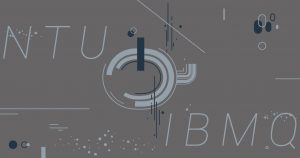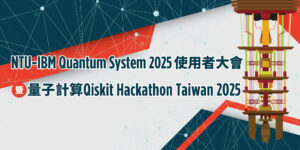Since its establishment in January 2019 with funding from the Ministry of Science and Technology (now National Science and Technology Council, NSTC), the NTU-IBM Quantum Hub has continuously provided a quantum computing platform for academic research and interdisciplinary collaboration in Taiwan, while also taking on the important mission of promoting quantum computing education nationwide. Since the first Quantum Computing Hackathon was held in 2020 at the NTU Xitou Education Center, the event was suspended in 2021 due to the pandemic, but was subsequently held annually at Syntrend Creative Park 11F in Taipei in 2022, 2023, and 2024. From August 13 to 15, 2025, the NTU-IBM Quantum System Users Meeting and the three-day 2025 Qiskit Quantum Computing Hackathon returned once again to Syntrend Creative Park 11F. (Event website: https://quantum.ntu.edu.tw/)
This year’s Hackathon attracted over 80 domestic registrants, the majority of whom already had experience using IBM Quantum systems, showcasing the significant progress made in the promotion of quantum computing in recent years. In addition to local domestic participants, the event continued to welcome international partners, including Keio University (Japan), Yonsei University (Korea), and Czech Technical University in Prague (Czech Republic), each sending 6–8 students to join, making the competition more international, diverse, and challenging.
The opening ceremony featured remarks by NSTC Department of Natural Sciences and Sustainable Development Director Ming-Chih Lai and NSTC Quantum System Promotion Working Group Convener Prof. Shangjr (Felix) Gwo, followed by a keynote lecture delivered by Dr. Vishal Sharathchandra Bajpe of IBM Quantum, who shared the latest trends in quantum computing. To enhance the challenge and excitement, this year’s Hackathon once again revealed the competition topics on-site, with team formation taking place during the event. Participants were required to design quantum programs, obtain results using Qiskit, and deliver oral presentations in English, evaluated by both peers and judges. Evaluation criteria included: Complexity of the quantum technology applied, Originality of the problem and creativity in the solution, Team collaboration and presentation skills, and Potential contribution to future society. Winning teams were selected by the jury, bringing the 2025 Hackathon to a successful conclusion.

This year’s event was primarily funded by the NSTC, organized by NTU-IBM Quantum Hub, and supported by IBM Quantum,which provided on-site coaches to guide participants. Co-organizers included the Chung Yuan Christian University Quantum Information Center, the Center for Quantum Science and Engineering at NTU, the Center for Advanced Computing and Imaging in Biomedicine at NTU, the National Center for Theoretical Sciences – Physics Division, and the Taiwan Association of Quantum Computation and Information Technology (TAQCIT). Domestic companies also actively supported the event, not only by sending employees to participate in the competition but also by sponsoring generous awards. In addition to the NSTC Jury Prize and the NTU-IBM Quantum Computing Center Prize, corporate awards were sponsored by Foxconn, Formosa Plastics Corporation, Wistron, and Keysight Technologies.
Cultivating cross-disciplinary talents with practical experience, as well as developing essential quantum applications, forms a critical foundation for Taiwan’s long-term quantum technology development. The promotion of quantum computing education and widespread learning is a key driver in advancing Taiwan’s quantum industry to the next level.

We describe briefly below the respective works of the five teams that won the Prizes in this Qiskit Quantum Computing Hackathon.
Group 2 developed a Quantum Hash Function based on Quantum Dynamics, combining Discrete-Time Quantum Walk (DTQW) and Continuous-Time Quantum Walk (CTQW). They successfully reproduced results from academic research, extended the output length to 256 bits, and improved overall performance. The team further validated their approach on real quantum hardware, demonstrating potential applications of quantum hashing in cybersecurity. Awarded the Enterprise Special Prize.

Group 9 proposed using Deep Reinforcement Learning (DRL) with Proximal Policy Optimization (PPO) to design more efficient Variational Quantum Circuits (VQC). Their approach allowed automated learning of quantum gate arrangements and parameters, balancing accuracy in energy estimation with circuit depth efficiency. Applied to molecular ground state energy estimation, the method showed strong potential for quantum chemistry simulations. Awarded the Enterprise Special Prize.

Group 12 focused on Quantum Circuit Validation and Equivalence Checking, introducing a Clifford Twirling-based randomized input testing method to verify circuit equivalence under varied inputs. This overcame limitations of traditional statevector comparison and successfully detected differences even when only a few gates were altered. Experiments on IBM quantum hardware confirmed equivalence validation of circuits exceeding 30 qubits, highlighting applications in circuit transpilation and optimization correctness checks. Awarded the Enterprise Special Prize.

Group 6 applied Sample-based Quantum Diagonalization (SQD) for molecular energy eigenvalue computation, benchmarking against VQE. The team achieved high-precision energy estimates for H₂O and CO molecules, and proposed improvements such as sigmoid bit-flip probabilities and dynamic ε adjustment, reducing errors by over 50%. Benchmark tests on IBM hardware with CH₂ and CO₂ validated the method. They further extended SQD to larger molecules, showcasing potential applications in drug molecule simulation.

Group 8 employed the Quantum Approximate Optimization Algorithm (QAOA) for multi-objective vehicle routing problems (VRP), reformulated as Max-Cut problems. Using weighted-sum methods to integrate objectives, the team successfully executed experiments on IBM Strasbourg and Brussels quantum devices, scaling up to 18 nodes with ~9-minute runtimes. Results confirmed QAOA’s viability on both simulators and hardware, with demonstrated potential for parameter transferability. Future work includes expanding cost functions and improving algorithm efficiency. Awarded the NTU-IBM Quantum Hub Prize.

Group 14 implemented Generalized Quantum Amplitude Estimation (QAE) for Monte Carlo integration, earning the competition’s top honor. The team compared classical and quantum methods on sin² functions, testing both QAE and IQAE on simulators and real hardware. Results showed that quantum methods required only about one-tenth of the samples for the same precision, improving error scaling from O(1/√N) to O(1/N). Applications extended to random walk prediction, with further exploration of noise effects and optimization. The open-source code can be adapted to other integration problems. Awarded the Grand Jury Prize.






